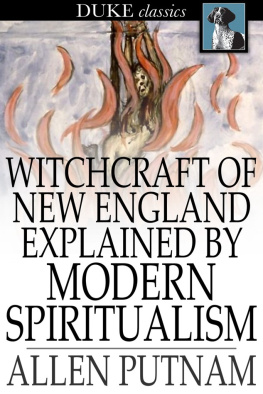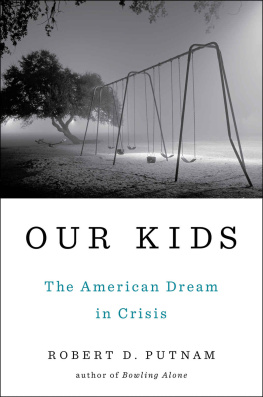Above Suspicion
Joe Sharkey

The baby threw up just as the eighteen-wheel coal truck with the word Jesus on its front plate barreled out of a blind switchback and bore down on them like a forty-ton avalanche of soot.
It was a drizzly, cold afternoon in February 1987. Skidding on the slick mountain road, Mark Putnam managed to pull the 1980 Oldsmobile far enough off to the side, where he slowed to a crawl, the passenger door nearly scraping the granite wall that went a hundred feet up. The coal truck rumbled by with its horn shrieking.
Oh my God, Kathy Putnam said in a slow, low voice from the back seat, where two-year-old Danielle lay across her lap, miserable with car sickness and fatigue.
When they caught their breath, Kathy cleaned up with a diaper. Her gaze met her husbands dark eyes in the rearview mirror. Listen, Kat, we dont have to do this, he said with a grimace, and added, only partly in jest, Do you want to turn around and go back to Connecticut?
Kathy was nothing if not a good sport. Three years before, when she and Mark had dashed off to get married in New York City, she had known very well what she was getting into. Mark was a young man with one overriding goal: He intended to be an FBI man. And together, they had accomplished that. Theirs was a marriage remarkable for its synergyher hard-nosed realism applied to his unchecked zeal, his fortitude to her diffidence, creating a force that augmented their individual strengths. If Marks first assignment out of the FBI Academy was a forlorn outpost in the isolated mountainous coalfields of eastern Kentuckyin Pikeville, a town neither of them had heard of until two weeks earlierwell, they would make a go of it and wait for a better assignment in years to come.
Kathy smiled, tickled the babys chin, and said, Its going to be okay. Youll see. Mark guided the old car, its engine straining, up the steep mountain road.
We keep going up, he said disconsolately from the front seat, where he was wedged uncomfortably between the door and a stack of pillows on top of a picnic cooler and some cardboard boxes that claimed the passenger.
Gotta go down eventually, she replied cheerfully.
In a while, they were relieved to see a road sign, CONGESTED AREA , but it only marked the truck pull-off for a coal-mine operation below the blasted rocks and stepped contours of a strip-mined mountain. Heaps of coal chunks clattered noisily on conveyor tracks that crisscrossed down from outcrops high up the ridge. Broken trees and shattered boulders lay scattered on the site in huge heaps. Staring in wonder, they drove past and started another steep climb.
Kathy frowned at a Triple-A road map, but it was clear there was no real choice except to go straight ahead on the winding two-lane. There werent any intersections, and few pull-offs. But after a while, they saw evidence of a settlement: unpainted little frame houses set onto shelves of land hacked into the hills; tumbledown bungalows and rust-streaked trailers pushed up close against the highway, as if waiting to pull out into traffic. On a sagging front porch, a woman in a faded print housedress and muddy field boots studied them from a rocker.
A mile farther, the highway bored down abruptly and swept open into four lanes at the base of a deep gorge blasted through the rock, with walls one hundred feet high, the surfaces of which were veined with glistening narrow seams of coal that might have been drawn in by a thick black marker. They sped past another road sign, PIKEVILLEPOP. 4,500 , and past an exit that wound around into a small community shadowed by surrounding mountains and skirted by a narrow meandering brown river. A jumble of neat buildings dominated by a brick courthouse with a weather vane on top, Pikeville looked like a village in a model railroad display, except for another billboard at the entrance to town, this one bigger, that said:
HILLBILLY DAYS!!!
Fun filled weekend carnival celebrating the heritage of PIKEVILLE, KY
Rides! Handicrafts! Good eatins.
April 24-25-26
Yall Come!
On either side of the billboards message were cartoon images of stereotypical shotgun-wielding hillbillies with ratty straw hats, patched overalls, big gnarly bare feet, and goofy smiles showing missing front teeth.
Is this us? Kathy said, taking this sight in with some amusement.
Mark looked anything but amused. He drove on slowly. A mile beyond the exit, the road narrowed and began to climb once more. Mark made a U-turn and drove back to the little town in the coalfields of Kentucky where their lives would change forever. In 1997, Kathy Putnam was twenty-seven years old, six months younger than her husband. She and Mark had both grown up in Connecticut, where they had met five years earlier. With their daughter, they made a handsome and cozy familyMark, dark and sensitive, a muscular young man who had been a star athlete in college and stayed in shape by running and lifting weights; Kathy, with her delicate features and untamed light brown hair, hopelessly unathletic; and amiable Danielle, already chatty, with her mothers quick smile and her fathers flashing eyes. If the FBI had commissioned a recruitment commercial to get young families to consider a career in the bureau, the Putnams would have been in it.
But that commercial probably would have shown the family arriving somewhere other than isolated Pikeville, the seat of Pike County, Kentucky, a corrugated chunk of land shaped, in fact, like a lump of coal. It sprawls over 785 square miles, most of them situated between two rivers, the Levisa Fork and the Tug Fork, which tumble out of the high watershed of the western Appalachian range down into the Cumberland Plateau. They flow north for about a hundred miles and join at the old railroad town of Louisa to form a river known as the Big Sandy, which then plunges northward under rocky escarpments forming the border between Kentucky and West Virginia, and finally empties into the Ohio River.
It is a land extravagantly endowed with mineral and other natural resourcesand thus cursed with plunder. After the Civil War, timber barons cleared the mountains of their magnificent hardwood forests, and when they were gone, coal barons came in to dig for the wealth underneath. Under a thin veneer of modest prosperity in small towns such as Pikeville, the toll of over a century of feverish exploitation was evident, both physically and socially, as Appalachian historian Harry M. Caudill put it, in exhaustion of soil, exhaustion of men, exhaustion of hopes.
Dogpatch was what some new arrivals called the place. The term, though a misnomer with origins in Al Capps classic Lil Abner comic strip set in a fictional Arkansas hamlet, conveyed the disdain outsiders often bring to their first encounters with hillbillies and the condescension that has always seeped down the map to rural southern Appalachia from the urban media centers. During the heyday of the sensationalist press in the late 1880s, big-city newspapers from the East were drawn to southern Appalachia by the colorful narratives afforded by the HatfieldMcCoy feud. The stories gave birth to the stereotype of hillbillies as perpetually befuddled lummoxes engaged in contentious disputes, surrounded by sexually amenable Daisy Maes, bumptious elders, and assorted comic shotgun-toting wild men, all coexisting in dim-witted timeless bliss in a junkyard Eden where tranquility is regularly shattered by thumping mountain quarrels.












